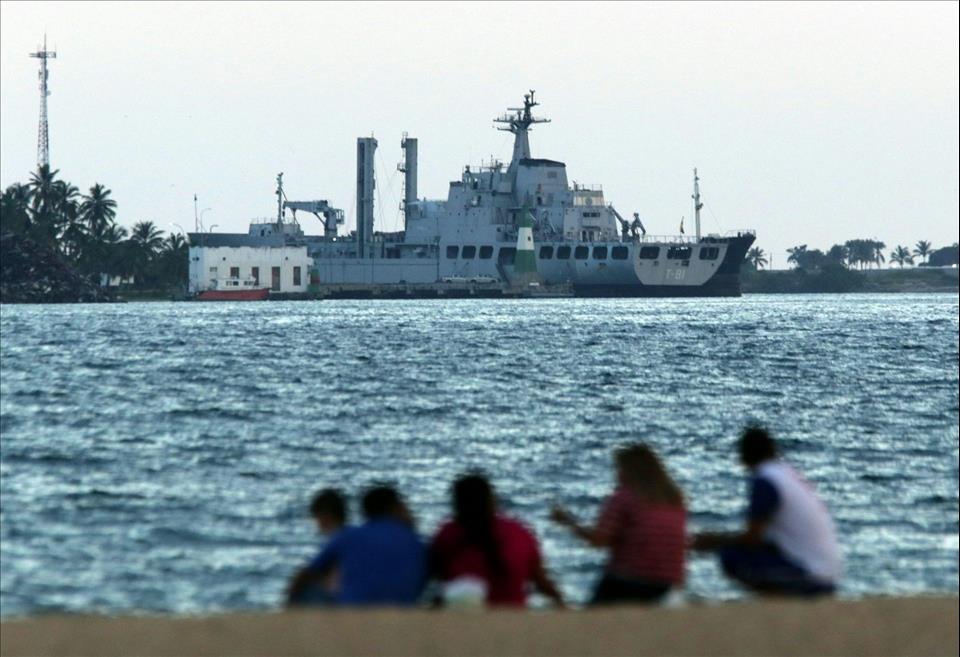
The US Has Deployed Warships Near Venezuela In A Cartel Crackdown But Direct Military Action Is Unlikely
These moves take place as the Trump administration escalates pressure on the Venezuelan president, Nicolás Maduro, who has now accused the US of plotting to oust him from power.
Donald Trump has long called Maduro“one of the largest narcotics traffickers in the world”, saying he heads the Venezuelan Cartel of the Suns. The US recently doubled the reward for Maduro's arrest to US$50 million (£37.1 million).
When asked about the possibility of direct military action in Venezuela, White House press secretary Karoline Leavitt remarked :“President Trump has been very clear and consistent. He's prepared to use every element of American power to stop drugs from flooding into our country and to bring those responsible to justice.”
Latin America is no stranger to US military interventions and regime changes. Washington sponsored covert and overt military operations in the region, from Chile to Brazil and Guatemala to Grenada, that led to regime changes in the second half of the 20th century.
So the presence of a US military submarine and guided missile cruiser close to its territorial waters has justifiably rattled Venezuela's leadership. Maduro has called on his countrymen and women to join nationalist militias, declaring :“no empire will touch the sacred soil of Venezuela”. And Venezuela's navy has deployed warships and drones to patrol the coastline.
The Trump administration has said little about its intentions. But most analysts agree the US is not preparing to invade Venezuela. The naval build-up is much more likely to be an attempt to get Latin American governments to take stronger action against drug traffickers.
The US recently doubled its reward for Maduro's arrest. Mario Caicedo / EPA Falling in line
Cracking down on transnational drug cartels has become a defining theme of Trump's second presidency. Shortly after returning to office in January, he issued an executive order formally designating eight of them“foreign terrorist organisations”.
This included six organisations based in Mexico: the Cartel del Golfo, Sinaloa Cartel, Cartel de Jalisco Nueva Generacion, Carteles Unidos, La Nueva Familia Michoacana and Cartel del Noreste. It also included the Mara Salvatrucha (more commonly known as MS-13), which originated in California, and the Venezuela-based Tren de Aragua.
A White House statement at the time said:“The Cartels have engaged in a campaign of violence and terror throughout the Western Hemisphere that has not only destabilized countries with significant importance for our national interests but also flooded the United States with deadly drugs, violent criminals, and vicious gangs.”
In August, Trump then signed a secret directive ordering the Pentagon to use military force against these cartels. The US secretary of state, Marco Rubio, has gone on record defending this directive. He said on August 7 that it allows the US to“use other elements of American power, intelligence agencies, the Department of Defense, whatever ... to target these groups if we have an opportunity to do it.”
There are several legal issues associated with direct US military action in Latin America, which reduce the prospect of any such assault taking place. It would violate the sovereignty of countries there, while launching strikes without congressional approval or a UN mandate would risk breaching domestic prohibitions.
For instance, there are debates over whether murder charges could be brought against US service members acting outside of a congressionally authorised armed conflict if they were to kill civilians or criminal suspects who pose no imminent threat.
Whether or not the US military is brought directly into the fight against the cartels will become clearer in the weeks and months ahead. However, there is some evidence that the mere threat of US military intervention is hardening the stance of some countries in the region towards criminal groups.
The Mexican president, Claudia Sheinbaum, for instance, has said“her government will cooperate with the US to fight drug trafficking”. To avoid any unilateral military strike against cartels that might undermine Mexican sovereignty, Sheinbaum has deployed tens of thousands of national guard troops across the country to stem the flow of drugs towards the US.
Maduro has more recently also pledged to send 15,000 Venezuelan troops to the border with Colombia. And he thanked Colombia for sending 25,000 military personnel to the border to tackle“narco-terrorist gangs”. The Colombia-Venezuela border is porous and has long been a key transit point for drug traffickers and smugglers.
Further south, in Paraguay, there is official support for Trump's anti-cartel policies. Taking a leaf from Washington's rule book, the Paraguayan president, Santiago Peña Palacios, has designated the Cartel of the Suns a foreign terrorist organisation.
Elsewhere in Latin America, El Salvador's leader, Nayib Bukele, has been a trusted ally of the US in its battle against drug cartels. Bukele has been successful in curbing the power and influence of MS-13, putting most of its members behind bars in the country's high-security prison.
El Salvador is also incarcerating kingpins and criminals deported from the US. If the increasingly focused US pressure is successful, it may be just a matter of time before all countries in Latin America fall in line with Trump's war on drug cartels.

Legal Disclaimer:
MENAFN provides the
information “as is” without warranty of any kind. We do not accept
any responsibility or liability for the accuracy, content, images,
videos, licenses, completeness, legality, or reliability of the information
contained in this article. If you have any complaints or copyright
issues related to this article, kindly contact the provider above.


















Comments
No comment